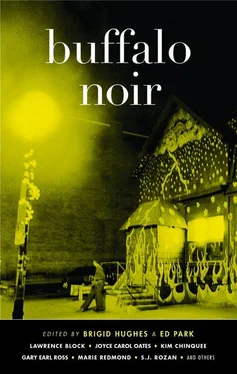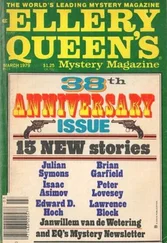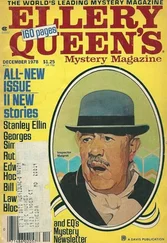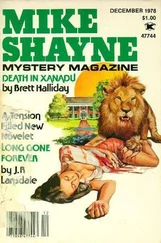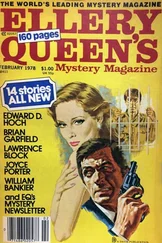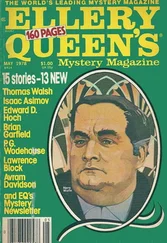Lawrence Block
Ehrengraf Settlement
“Let me have men about me that are fat,
Sleek-headed men, and such as sleep a-nights.
Yond Cassius has a lean and hungry look.
He thinks too much. Such men are dangerous.”
— William Shakespeare
Ehrengraf, his mind abuzz with uplifting thoughts, left his car at the curb and walked the length of the flagstone path to Millard Ravenstock’s imposing front door. There was a large bronze door-knocker in the shape of an elephant’s head, and one could lift and lower the animal’s hinged proboscis to summon the occupants.
Or, as an alternative, one could ring the doorbell by pressing the recessed mother-of-pearl button. Ehrengraf fingered the knot in his tie, with its alternating half-inch stripes of scarlet and Prussian blue, and brushed a speck of lint from the lapel of his gray flannel suit. Only then, having given both choices due consideration, did he touch the elephant’s trunk, before opting instead for the bell-push.
Moments later he was in a paneled library, seated in a leather club chair, with a cup of coffee at hand. He hadn’t managed more than two sips of the coffee before Millard Ravenstock joined him.
“Mr. Ehrengraf,” the man said, giving the honorific just enough emphasis to suggest how rarely he employed it. Ehrengraf could believe it; this was a man who would call most people by their surnames, as if all the world’s inhabitants were members of his household staff.
“Mr. Ravenstock,” said Ehrengraf, with an inflection that was similar but not identical.
“It was good of you to come to see me. In ordinary circumstances I’d have called at your offices, but—”
A shrug and a smile served to complete the sentence.
In ordinary circumstances, Ehrengraf thought, the man would not have come to Ehrengraf’s office, because there’d have been no need for their paths to cross. Had Millard Ravenstock not found himself a person of interest in a murder investigation, he’d have had no reason to summon Ehrengraf, or Ehrengraf any reason to come to the imposing Nottingham Terrace residence.
Ehrengraf simply observed that the circumstances were not ordinary.
“Indeed they are not,” said Ravenstock. His chalk-striped navy suit was clearly the work of a custom tailor, who’d shown skill in flattering his client’s physique. Ravenstock was an imposing figure of a man, stout enough to draw a physician’s perfunctory warnings about cholesterol and type-two diabetes, but still well on the right side of the current national standard for obesity. Ehrengraf, who maintained an ideal weight with no discernible effort, rather agreed with Shakespeare’s Caesar, liking to have men about him who were fat.
“‘Sleek-headed men, and such as sleep a-nights.’”
“I beg your pardon?”
Had he spoken aloud? Ehrengraf smiled, and waved a dismissive hand. “Perhaps,” he said, “we should consider the matter that concerns us.”
“Tegrum Bogue,” Ravenstock said, pronouncing the name with distaste. “What kind of a name is Tegrum Bogue?”
“A distinctive one,” Ehrengraf suggested.
“Distinctive if not distinguished. I’ve no quarrel with the surname. One assumes it came down to him from the man who provided half his DNA. But why would anyone name a child Tegrum? With all the combinations of letters available, why pick those six and arrange them in that order?” He frowned. “Never mind, I’m wandering off-topic. What does his name matter? What’s relevant is that I’m about to be charged with his murder.”
“They allege that you shot him.”
“And the allegation is entirely true,” Ravenstock said. “I don’t suppose you like to hear me admit as much, Mr. Ehrengraf. But it’s pointless for me to deny it, because it’s the plain and simple truth.”
Ehrengraf, whose free time was largely devoted to the reading of poetry, moved from Shakespeare to Oscar Wilde, who had pointed out that the truth was rarely plain, and never simple. But he kept himself from quoting aloud.
“It was self-defense,” Ravenstock said. “The man was hanging around my property and behaving suspiciously. I confronted him. He responded in a menacing fashion. I urged him to depart. He attacked me. Then and only then did I draw my pistol and shoot him dead.”
“Ah,” said Ehrengraf.
“It was quite clear that I was blameless,” Ravenstock said. His high forehead was dry, but he drew a handkerchief and mopped it just the same. “The police questioned me, as they were unquestionably right to do, and released me, and one detective said offhand that I’d done the right thing. I consulted with my attorney, and he said he doubted charges would be brought, but that if they were he was confident of a verdict of justifiable homicide.”
“And then things began to go wrong.”
“Horribly wrong, Mr. Ehrengraf. But you probably know the circumstances as well as I do.”
“I try to keep up,” Ehrengraf allowed. “But let me confirm a few facts. You’re a member of the Nottingham Vigilance Committee.”
“The name’s unfortunate,” Ravenstock said. “It simply identifies the group as what it is, designed to keep a watchful eye over our neighborhood. This is an affluent area, and right across the street is Delaware Park. That’s one of the best things about living here, but it’s not an unmixed blessing.”
“Few blessings are,” said Ehrengraf.
“I’ll have to think about that. But the park — it’s beautiful, it’s convenient, and at the same time people lurk there, some of them criminous, some of them emotionally disturbed, and all of them just a stone’s throw from our houses.”
There was a remark that was trying to occur to Ehrengraf, something about glass houses, but he left it unsaid.
“Police protection is good here,” Ravenstock continued, “but there’s a definite need for a neighborhood watch group. Vigilance — well, you hear that and you think vigilante , don’t you?”
“One does. This Mr. Bogue—”
“Tegrum Bogue.”
“Tegrum Bogue. You’d had confrontations with him before.”
“I’d seen him on my property once or twice,” Ravenstock said, “and warned him off.”
“You’d called in reports of his suspicious behavior to the police.”
“A couple of times, yes.”
“And on the night in question,” Ehrengraf said, “he was not actually on your property. He was, as I understand it, two doors away.”
“In front of the Gissling home. Heading north toward Meadow Road, there’s this house, and then the Robert Townsend house, and then Madge and Bernard Gissling’s. So that would be two doors away.”
“And when you shot him, he fell dead on the Gisslings’ lawn.”
“They’d just resodded.”
“That very day?”
“No, a month ago. Why?”
Ehrengraf smiled, a maneuver that had served him well over the years. “Mr. Bogue — that would be Tegrum Bogue — was unarmed.”
“He had a knife in his pocket.”
“An inch-long penknife, wasn’t it? Attached to his key ring?”
“I couldn’t say, sir. I never saw the knife. The police report mentioned it. It was only an inch long?”
“Apparently.”
“It doesn’t sound terribly formidable, does it? But Bogue’s was a menacing presence without a weapon in evidence. He was young and tall and vigorous and muscular and wild-eyed, and he uttered threats and put his hands on me and pushed me and struck me.”
“You were armed.”
“An automatic pistol, made by Gunnar & Swick. Their Kestrel model. It’s registered, and I’m licensed to carry it.”
“You drew your weapon.”
“I did. I thought the sight of it might stop Bogue in his tracks.”
Читать дальше
